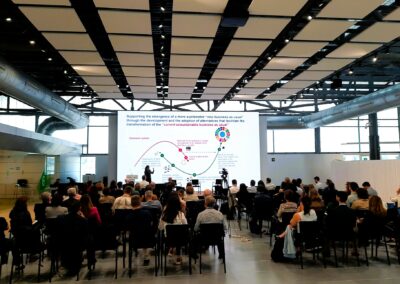
Our story
CircleMED approach is innovative because it is integrated and systemic and it allows to impact all the three-dimension features of the Sustainable Development model: economic prosperity,
environmental protection and social equity. This systemic and innovative vision builds upon existing experience and creates synergies with other initiatives, in particular:
– inclusive governance approaches on citizens’ participation take advantage of resources and practical information to support city-level circular action shared by the Circular City Centre (C3), a competence and resource centre within the European Investment Bank;
– the creation of a tools of circularity assessment for businesses starts from the tools developed by MED projects “finMED”, “BLUEfasma” and “Embrace”, and from the “Actif” platform developed in the Alcotra project “Clip”;
– the creation of circular governance models and Hubs on territorial circular economy starts form the OECD Checklist for Action for transitioning to the circular economy (“The Circular Economy in Cities and Regions”).
PARTNERS

CircleMED is the project of 7 partners, active in the sectors of research, development, circular economy and technology, in the EU Mediterranean area:
- University of Turin (Italy)
- Larnaca and Famagusta Districts Development Agency (Cyprus)
- Technological Corporation of Andalusia (Spain)
- Sarajevo Economic Region Development Agency (Bosnia and Herzegovina)
- The Var Chamber of Commerce and Industry (France)
- Bulgarian Association of Recycling (Bulgaria)
- Centre for Research and Technology (Greece)
MEDIA KIT
One sentence
Interreg CircleMED aims to convert the Med area into circular-economy-based territories, accelerating the diffusion of circular and climate-neutral practices and the green transition of the local civil, industrial and institutional systems.
One paragraph
The European project CircleMED aims at converting the European Mediterranean area into circular economy based territories, supporting the development of the circular economy principles at a territorial level.
By testing solutions that already exist, but that have never been used together, the project aims at further developing and scaling up circular approaches, methodologies and strategies easily adaptable to any kind of territory.





